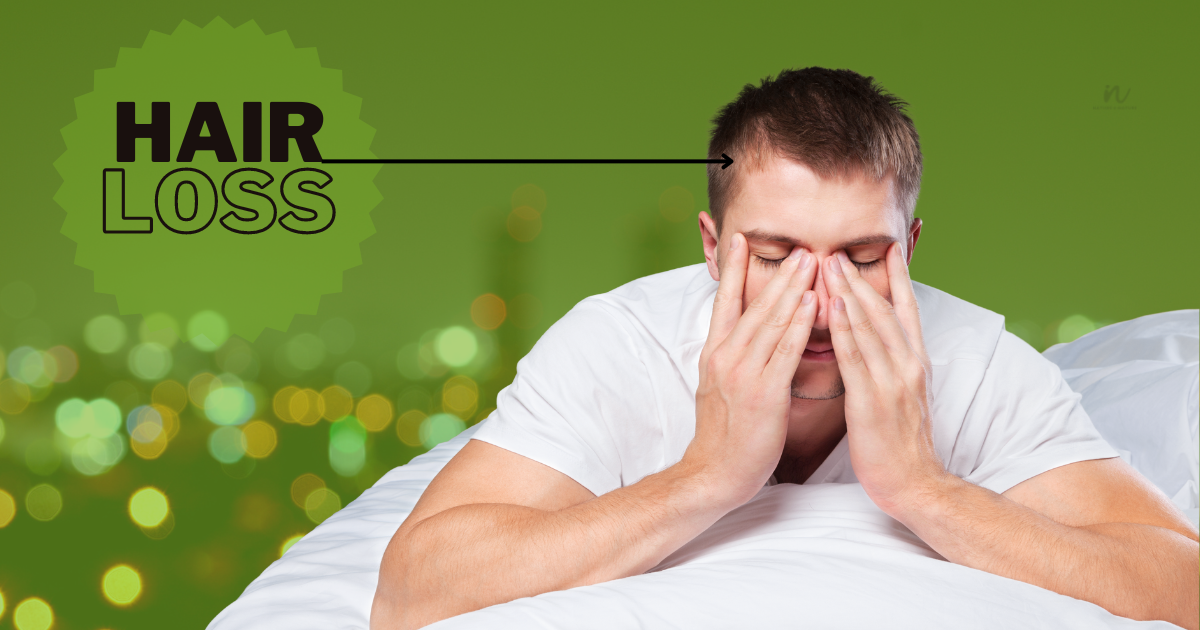Sleep plays a crucial role in regulating bodily functions, including brain regeneration, hormone production, and the activation of adult stem cells. Even minor disturbances in sleep patterns can significantly impact both physical and mental health. Problems like memory loss, mood disorders, and even skin issues can be triggered by poor sleep. But one lesser-discussed impact is hair health. So, does lack of sleep cause hair loss? Let’s explore how your sleep patterns might be silently sabotaging your strands and what you can do to reverse the damage.
How Does Lack of Sleep Lead to Hair Loss?
According to the National Institutes of Health (NIH), the quality and duration of your sleep are directly linked to your hair’s health. A restful night helps restore essential proteins, enzymes, and hormones—especially melatonin, which is critical in regulating sleep and stimulating hair growth.
There are two major effects of sleep deprivation on hair health:
1. Hormonal Disruptions:
Melatonin helps stimulate hair follicles. Less sleep leads to reduced melatonin production, which can disrupt your hair growth cycle and increase hair fall.
2. Increased Stress Levels:
Chronic sleep deprivation causes physical stress, leading to a condition called Telogen Effluvium, where hair prematurely enters the shedding phase. As stress hormones like cortisol spike, hair follicle health suffers, resulting in thinning and increased fall.
Is Your Hair Falling Out Due to Lack of Sleep?
Sleep-deprived individuals may notice:
-
Increased hair shedding during brushing or washing.
-
Thinner hair strands or patchy hair density.
-
Itchy or inflamed scalp from hormonal imbalances and oxidative stress.
If these symptoms persist, it’s essential to address sleep hygiene and lifestyle before seeking medical intervention.
Best Ways to Treat Hair Loss Caused by Sleep Deprivation
1. Improve Sleep Quality:
-
Keep your room temperature between 60–67°F for optimal sleep.
-
Avoid screens at least 60 minutes before bedtime.
-
Limit day-time naps to 15–30 minutes only.
-
Drink calming herbal teas like chamomile before bed.
-
Maintain a consistent sleep schedule to regulate your circadian rhythm.
2. Eat a Hair-Healthy Diet:
Nutrient deficiencies worsen hair thinning. Include foods rich in:
-
Biotin – Eggs, nuts, seeds
-
Vitamin D – Mushrooms, fatty fish
-
Zinc – Legumes, pumpkin seeds
-
Iron – Leafy greens, red meat
-
Vitamin E & A – Carrots, almonds, spinach
A well-rounded diet boosts follicle strength and helps reverse the damage caused by poor sleep.
Can Hair Regrow If Sleep Improves?
Yes, it can. Once cortisol levels normalize and hormone balance is restored through consistent sleep, your body begins to function optimally again. This means your hair growth cycle can reset, allowing for new, stronger strands to emerge. However, patience is key—it may take a few weeks to months to see visible changes.
How to Support Hair Regrowth Naturally
-
Use chemical-free products like Nature4Nature’s Hibiscus & Argan Oil Glossy Glow Shampoo, which support scalp health.
-
Regularly oil your hair with natural anti-hair fall oils like rosemary or amla.
-
Practice stress-reduction techniques: yoga, mindfulness, walking, journaling.
-
Stay hydrated—drink 8–10 glasses of water daily to keep scalp and hair cells healthy.
Conclusion:
Yes, lack of sleep can cause hair loss, and it often does so silently through hormone imbalance and stress elevation. But the good news is—it’s reversible. Start with fixing your sleep schedule and pair it with a balanced diet and gentle hair care. If you continue experiencing excessive hair loss despite lifestyle changes, consult a dermatologist for professional evaluation.


